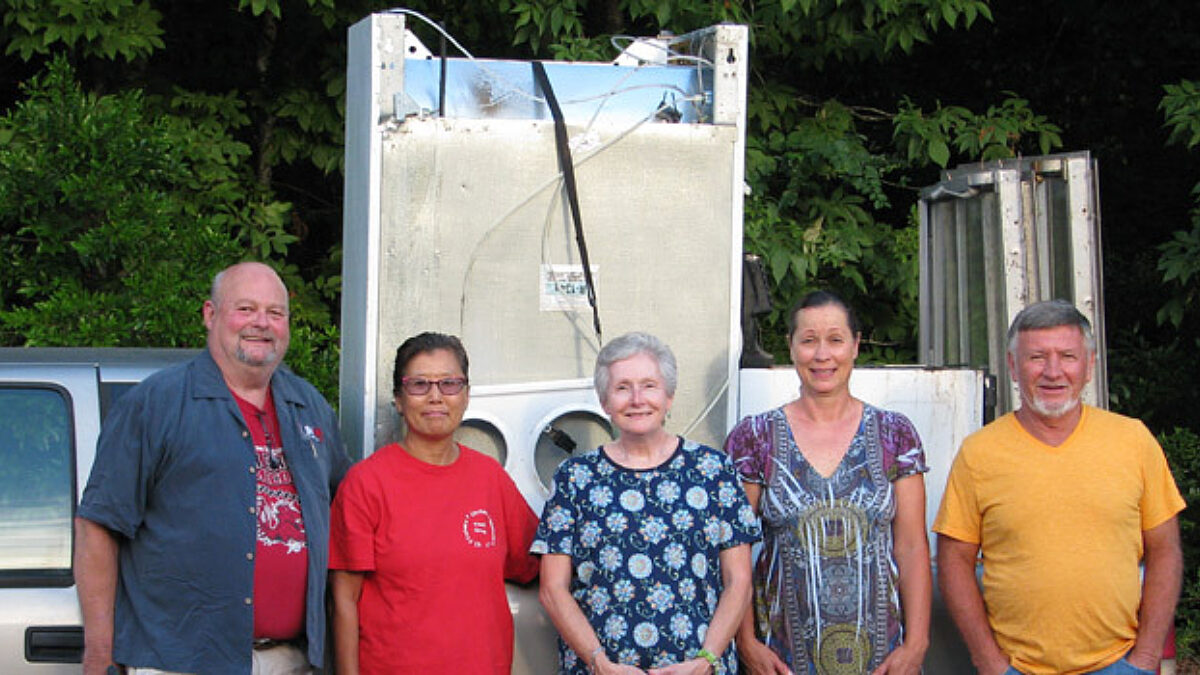
Living water: Swansea church recycles scrap metal to help families get water
By Laura Camby McCaskill
SWANSEA—Scrap metal—it’s everywhere. Too heavy to move and hard to get rid of, most people pass it by without a second thought. From large appliances to cars that weigh tons, there is no shortage in scrap metal.
But there is a shortage in water. According to the Centers for Disease Control and Prevention, worldwide, 780 million people do not have access to an improved water source. An estimated 2.5 billion people lack access to improved sanitation. Roughly 1.3 million Americans still don’t have hot and cold running water, a bathtub or shower or a working toilet, and many more don’t have clean water that’s safe to drink.
Now, one South Carolina church has taken scrap metal no one wants to bring water to people in need. Longtime member of Calvary United Methodist Church and avid recycler Frances Fogle heads the Living Water Project at Calvary with the help of Yong Brophy, Holly Abbott and former pastor Steven Scheid.
Started this spring, the Living Water Project recycles scrap metal from the community and uses the proceeds to provide water to a Navajo Indian reservation in Baca, New Mexico, through an organization called Dig Deep.
Dig Deep, founded by George McGraw of Los Angeles, is a human rights nonprofit that works to ensure every American has clean running water forever. On the reservation in Baca, for instance, most families do not have running water of any kind and rely on a water truck that brings water once a month. They fill anything they have at the time with water in order to survive, which is often not sanitary. Dig Deep’s mission is to bring in a system to provide safe and clean water for every family. One hundred percent of donations go toward the project.
Dig Deep installs a 1,200-gallon cistern and a pump, which is powered by solar panels that filter clean water into the home. The water is protected against sunlight, contamination and freezing. Because most homes do not have electricity, they also install LED lights for the home at night. They do not dig wells, because in that part of the country, you can drill down as far as 600 feet and still not reach water.
One system, which will provide water for one family without electricity, costs $4,500. If the family already has electricity, the cost drops to $3,000.
The system supplies water for life.
“I can’t say enough good things about the foundation,” Fogle said.
How it works at Calvary
Fogle and her Living Water Project team from Calvary UMC travel all over Swansea, stopping at house after house to pick up old appliances and unwanted items and turn them in for money.
“Frances’ love for helping others is contagious,” Scheid said.
In Swansea, Fogle said, the going rate for scrap metal is $5.75 per 100 pounds; other areas may differ. The money is saved until enough is raised to provide a water system for a family.
“We make four to five trips to the scrap yard a week,” Fogle said, noting she uses the knowledge taught to her by recycler Lewis Chaney.
Since the inception of the project, Fogle said, the team has collected scrap metal from 28 different homes so far.
“We might go to the same house four and five times before it’s completely cleaned up. We still have more houses to go,” Fogle said. “We take things apart to get the most money we can out of the item.”
She uses her own money to pay for gas, and she lifts up both the United Methodist Women and the United Methodist Men of the church, both of which have been a big help to the project.
“There are things that we can’t lift like lawnmowers, (and the men will) come, load it up and take it for us. They’ve given us straps to help hold things down, also,” she said.
Since the start of the ministry, Calvary UMC has recycled 21,261 pounds of scrap metal. They have raised enough money to provide one family with a water system, and as of press time, they’re $2,546 closer to getting a system for the next family.
The Living Water Project’s mission is to help as many families as they can.
“Prayers are also greatly appreciated—prayers for safety while loading and unloading, while traveling,” Fogle said. “Honestly, I’d like to see every United Methodist church have a Living Water Project.”
Anyone interested in starting their own Living Water Project is encouraged to email Fogle with questions: [email protected]. To learn more about helping Calvary’s effort, email Fogle or write P.O. Box 148, Swansea, SC 29160.
You can also take the “4-Liter Challenge” on Dig Deep’s website, www.Digdeep.org. The average American uses 100 gallons of water per day, but in places like Baca, the average person only gets 4 liters (1 gallon) of water per day. The 4-liter challenge is designed to show people how much water is taken for granted and how precious it really is.